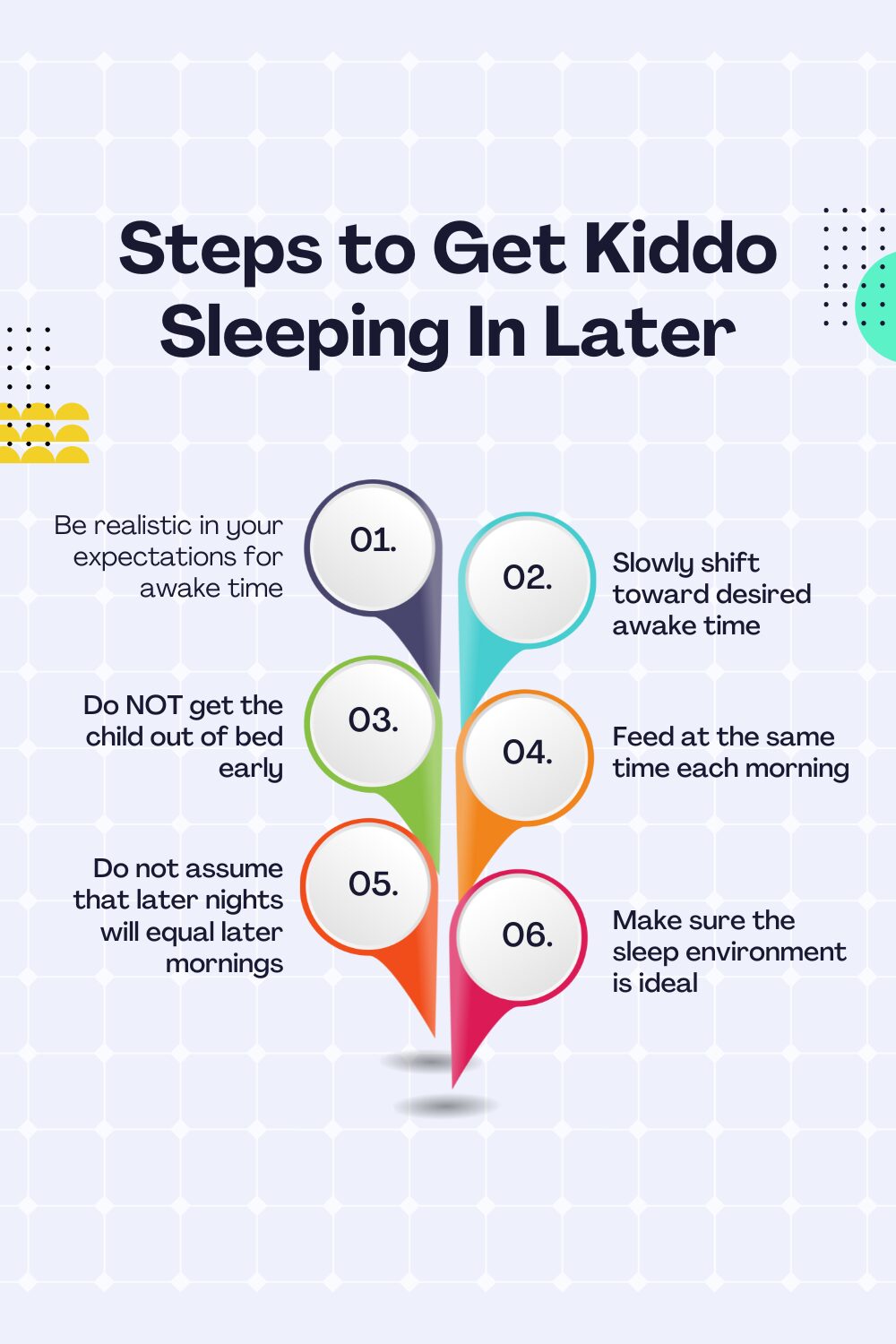Tired of early wakeups? Learn 8 practical, parent-tested steps to help your baby or toddler sleep later in the morning. From consistent feeding times to managing nap schedules—get expert tips to shift your child’s wake time and reclaim your mornings.

Remember the days when you didn’t have to get up to take care of living creatures in the morning? When school or work drove what time you had to wake up, but that was it? You could have variability in there. Hit snooze some mornings. Sleep in on weekends. Go to bed early every once in a while.
Then came parenthood. And out went the snooze button.
Being a parent is tiring.
What you would give for your child to sleep just that little bit longer in the morning!
Maybe you are a morning person, so waking up early isn’t that big of deal for you, but it would be really nice if you could get a workout in before your little one woke up, so shifting your schedule so your baby sleeps in later would be awesome.
Maybe you have a need in the schedule to have your little one wake up later, whether that be because of your work schedule or your child’s school drop off or pick up schedule.
Maybe you have a naturally early riser you want to encourage to sleep in a little later. Perhaps your kiddo is having early waking issue, which may be just a habit!
Whatever the reason, you really need your little one to sleep in later in the mornings.
How do you get there?
Post Contents
- 1. Feed At the Same Time Each Morning
- 2. DO NOT Get Child Out of Bed
- 3. Slowly Shift to Get to Desired Time
- 4. Be Realistic in Expectations for Wakeup Time
- 5. Do Not Assume Later Nights Will Equal Later Mornings
- 6. Be Sure the Environment is Set Up For Sleep
- 8. Analyze Your Daytime Nap Schedule
- Conclusion
- Related Posts
1. Feed At the Same Time Each Morning
The first rule for getting your first morning wakeup time to a certain time is to be consistent with that time of day.
You will want to be super consistent while you are establishing this wake up time. After the consistency is there, you can flex within 30 minutes on a regular basis and then flex further when needed. Just keep consistency the norm rather than the exception.
Have breakfast at the time you want your child eating breakfast. This means if you want a 7 AM wakeup time, do not be feeding breakfast each morning at 6:30.
There can, of course, be an exception to that. If you have a baby, your baby might not be able to make it to 7 AM. That is why I wrote a post for those 5-6 AM Night Wakings. Check that out for what to do.
So again:
- You want to be as consistent as you can be with what time you start each day.
- Once your little one is consistent, you can have a 30 minute window of flexibility. That means you can have your little one sleep in a little later one day if needed or start the day a little earlier if needed and be just fine.
- Once you are solid on that and you know how well your little one handles flexibility (some are just not very flexible!), you can be even more flexible at times if needed. Flexible is an occasional thing, not a regular thing.
2. DO NOT Get Child Out of Bed
Along the same line of thought as above, do not get your child out of bed before the time you want to consistently start your day.
I get it. You are tired. It seems like getting your little one up and letting them cuddle with you in bed, play with toys, or watch a show might buy you some more sleep. This will backfire.
The day will come that you will just want to get your toddler up and stick her in front of the television so you can try to sleep a little longer. Don’t do it! Do not do it unless you want to do it the next day. And the next. And yet the next. And on until you finally decide that needs to go.
I know because I have been there! Kaitlyn was a newborn. Her late-night waking woke Brayden up one night (or morning, depending on who you talk to). He wasn’t quite two. I was tired. He was wide awake. I had the “awesome” thought of, “I will just let him get up and watch PBS so I can sleep.”
Eh. Wrong.
Not only did he not let me sleep (because what toddler wants to sit alone watching TV in the wee hours of the morning?), but he woke early the next day, too, even without the baby having woken at the same time. He wanted to watch TV again! If TV was fun yesterday, it will be again today!
Just don’t start it.
That doesn’t mean you have to ignore your children. Once I realized my mistake with Brayden, I would go into my children’s rooms in those early morning hours and said, “It isn’t time to wake up yet. It is still night time.” Then I would tuck them back in and leave the room.
Did they fall back asleep? Sometimes. Other times they just lay there until it was time to wake up. But they did not start a new tradition of waking early each day.
3. Slowly Shift to Get to Desired Time
When I have a child waking before the best time of day to wake up, I like to slowly shift toward the preferred time. So if baby is waking at 6 AM and you really want 7 AM instead, spend a week having baby wait to get up and be fed until 6:15. A week later, move that to 6:30. Continue to move slowly until you have it to your desired time. This will help get your sleep schedule where you want it to be.
You can read the details of that process in this post: Tips for Shifting Your Schedule
4. Be Realistic in Expectations for Wakeup Time
You might have dreams of sleeping in until 8 AM each day, but dreams are not always reality.
Brayden is 20, and I can count on one hand the number of times IN HIS LIFE that he has slept until the 8 AM hour. No kidding. His natural disposition is just to wake early in the day. So work toward a time your child can reasonably attain.
That time might shift over time. My third and fourth children shifted slowly to waking up later and later. So just because you are looking at 7 AM with a 3 month old doesn’t mean it is a life sentence (though it might!).
>>>Read: Baby Sleeping Through the Night: Top Tips to Make it Happen

5. Do Not Assume Later Nights Will Equal Later Mornings
Later nights do not lead a young child to later mornings. It leads them to earlier mornings. Or night wakings. It is an idea that backfires big time. Sleep Begets Sleep. Later bedtimes will not lead to later mornings. You need bedtime to be at a reasonable hour to set your child up for a good night of sleep. Sometimes an earlier bedtime is actually your answer.
A consistent bedtime each night is important, just as it was important to get up at the same time each day. You need a consistent bedtime routine and a consistent time your child goes to bed. See Importance of Consistent Bedtime for more.
It is possible that your bedtime is not the ideal time for your kiddo. So you might have success in moving bedtime, just be careful you don’t think that pushing bedtime later will for sure push back the morning wake up time.
Your child should get somewhere between 10-12 hours of sleep at night, depending on their sleep needs. You can read more about this here: Sleep Totals: How Much Sleep Should Your Child Get?
>>>Read: How To Solve Your Baby’s Nighttime Sleep Issues
6. Be Sure the Environment is Set Up For Sleep
If your child’s bedroom is above the garage, your husband leaves for work at 6 AM, and your child wakes at 6 AM each day, then you have a safe bet that the garage is waking your child up.
Be aware of environmental things that can be waking your child up. Noises? Get a sound machine or white noise machine. Too hot? Think of ways to get the room cooler. Too cold? Put your child in an extra layer of pajamas (or add a blanket if you have a toddler or preschooler who is old enough to sleep with blankets). Sun too bright in the morning? Use some blackout blinds or blackout curtains. Be aware of environmental factors that impact sleep. See my post on Optimal Sleep Temps or Dressing Baby for Sleeping for help figuring this out.
>>>Read: The Essential Elements to Any Babywise Bedroom
7. Consider Possible Disruptions
There can be other things that will disrupt your child’s sleep and lead to early morning wake ups. This can include teeth coming in and causing pain. This can include a sleep regression interfering with night sleep. It might be that a nightmare or night terror is affecting your child’s sleep. Your baby might have a full diaper or your toddler might be potty training and unable to make it much later in the morning without going potty. Your child might be working on a new skill and is just excited to practice some more. Your baby might be ready to move into her own room for night sleep. There are many reasons for sleep disruptions, so if you have addressed the first six items listed in this post and your child is still waking early in the morning, consider these other possible causes.
8. Analyze Your Daytime Nap Schedule
It is always wise to think about your kiddo’s daytime sleep schedule even when you are trying to solve night sleep issues. Is your child sleeping well for naps? If not, you might need to do some overall sleep training. You probably have an issue that is bigger than just this early morning waking.
Are the nap times at the best times? How is each wake window? Do you need to drop a nap? Think about these things so you can decide if night sleep is being disrupted by something happening in the day.
Conclusion
These eight steps can help you get your little one to sleep in as late as is reasonable for your individual child. It can take time and it definitely takes consistency and patience, but you can get there!
Related Posts
- How to Use Cluster Feeding to Get Baby Sleeping All Night
- How to Drop Middle of the Night Feeding
- 5-6 AM “Night” Wakings
- Sleep Begets Sleep
- Ultimate Guide to Stopping Baby Poop at Night

This post was originally published on August 31, 2016


